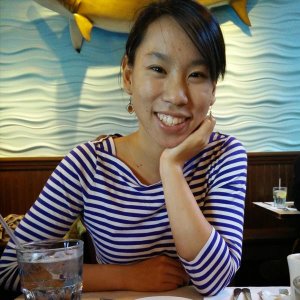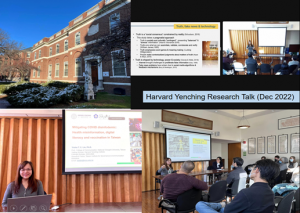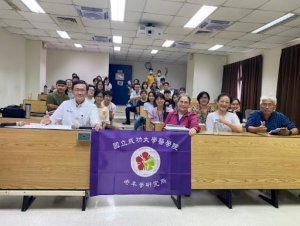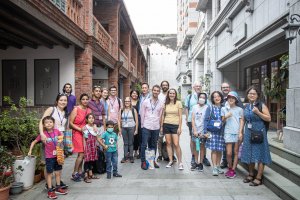I would first like to thank Fulbright Taiwan for giving me this opportunity to come to Taiwan and learn about its healthcare system. I would also like to thank my professor at Taipei Medical University, Professor Kun-Yang Chuang, for his unwavering and selfless support of both me and my project this past year. Finally, I would like to thank my family and friends for their continuous encouragement and love as I adjusted to a new country, culture, and language. I am truly thankful and happy that I chose to become a Fulbright Fellow this past year.
台灣最美的景就是人
One of the things that I am most grateful for in Taiwan is meeting such a warm and welcoming community of people — in particular my work friends at my host institution, Taipei Medical University. From the very first day that I met them, they made it their personal mission to make sure that I never ate lunch alone. They would make sure that I had my Easycard whenever we took the bus. Whenever I told them I was going somewhere, they would help me look up directions and make sure I knew where to go. We ate lunch and dinner together and went shopping together. They asked me about America and English, and they helped me navigate Taiwan and corrected my Chinese. Our dynamic was the epitome of cultural exchange. We created a notebook where they would teach me Chinese phrases and I would teach them English ones. They would tell me about places to visit in Taiwan and explain cultural phenomena to me. Mealtimes were about showing me new Taiwanese foods. We celebrated Thanksgiving together by eating a roast chicken in a department store food court. Even this wasn’t what I expected: to eat the chicken, we literally tore the chicken apart with our (gloved) hands.
Even though I am only in Taiwan for a short 10 month period, we all became close friends quickly. In February, one of my closest Taiwanese friends told me: Evelyn, 我會捨不得你. Will you remember us in 10 years? I half-jokingly assured her that since I had already spent so much effort into remembering all of their Chinese names, there was no way I would forget them. But she insisted, warning me that there’s only one of me to remember, but would I remember all of them? Her question was unexpected, but also very touching. The friendships that I made here in Taiwan will be a part of me even after I leave. It is true that the most beautiful scenery of Taiwan is its people.
你的中文真好!
Coming to Taiwan has forced me to strongly re-examine my Asian American identity. I grew up in the Bay Area in California, where Asian Americans are the majority ethnicity. I didn’t have to question my identity because everyone understood and accepted a Chinese – Taiwanese – American. However, in Taiwan, I look just like any other Taiwanese local. Thus, everyone assumed that I was one by first glance. This was my first experience with being assumed to be someone I am not, and it was highly uncomfortable for me. For the first few weeks I was in Taiwan, I reacted in the opposite extreme – rejecting everything Taiwanese and reinforcing my American identity. I wanted to scream out that I was a foreigner just like any other white person on the street. In hindsight, this was probably a byproduct of culture shock. However, at the time, I didn’t realize this. Instead, I sought everything American — English TV shows, English books, and the English language. Over time, I adjusted to the feeling of being assumed a local. Many times, other people would start talking to me in Mandarin, and I would respond to the easy, superficial questions. The fact that I responded in Mandarin reinforced their initial assumption, and they started speaking even faster. At these points in the conversation, I couldn’t keep up, and I would often give a blank stare. This would garner a confused reaction from the other party, and usually a look would follow saying something like: what is wrong with you? These looks were the worst — full of judgment and assumptions, stereotypes and disappointment. However, I would then explain that I was from America. These few words would completely change their reaction. While before they were confused as to why my Chinese was so bad, now they were surprised that my Chinese was so good!
The cultural differences between Taiwanese Americans and local Taiwanese were a little harder to reconcile than the language difference. I grew up with a Taiwanese immigrant mother and a Cantonese American father. The longer that I spend in Asia, and the more that I talk to other Asian Americans, the more I realize that my family is very Americanized. Many of the traditional Taiwanese beliefs, such as using Chinese medicine and respecting ghosts, I do not believe. These differences in beliefs are harder to see unless the topics come up in conversation, but they are also harder to reconcile. Many times, my friends and I just have to agree to disagree. Now, I realize that I cannot be a true Taiwanese local because I am heavily influenced by my American upbringing. I can understand and experience my heritage culture, but I will never integrate completely.
Dear Mom
One of my most important takeaways from this year has been a better understanding of my mother. Growing up, our household was split into an American half and a Chinese half. My mother made up the Chinese half, and we never consulted her or took her advice on anything American related. In reality, we only asked her to correct our Chinese homework because we thought she didn’t understand how American culture worked. Whenever she made sandwiches, they were double decker sandwiches with nontraditional ingredients. Whenever she pronounced “pizza,” she used a short “i” instead of long “i” sound because of the double z’s. She told us never to eat and read at the same time because it moved the blood from your stomach to your brain thus interrupting your digestive process, and she taught us to never sit on the toilet seat in public bathrooms, which I didn’t understand.
After coming to Taiwan, I can see where her perspectives come from. Taiwanese sandwiches are filled with potato salad with raisins and apples and sweet potatoes. They are all double decker sandwiches. The English they teach in Taiwan is strictly by the book, and many times the vocabulary is just wrong. For example, my friends told me that they were taught to use the phrase ‘last but not least’ as a formal essay conclusion. I had to tell them that they probably should not continue using that phrase for formal writing. My Taiwanese friends believe completely in Chinese medicine and other dietary superstitions like eating fruit before dinner instead of after so that your stomach will absorb the fruit nutrients better. Now, in Asia, I never sit on the toilet seat in public bathrooms because most of them are squatting toilets. The western toilets and toilet stalls in general in Taiwan are of questionable cleanliness, so sitting on the seat exposes you to many more germs than in the United States.
This year has helped me understand how tremendous a change my mother went through by choosing to move permanently to a new country. Now, she has pretty much given up all of her Taiwanese roots. She is more American than Taiwanese. I have no more family in Taiwan, so I rarely come back anymore. My cousins barely speak Mandarin now, and my sisters do not speak Mandarin either. I am very glad that I took this opportunity to reconnect with my heritage that is slowly being forgotten in our family.
You’re not in Kansas anymore
The initial months of adjustment to life in Taiwan were extremely difficult for me. I had just graduated college, and I had to adjust simultaneously to post-college life as well as life in a new country. On top of that, my research was at a standstill until February, meaning that for the first few months of my grant, I really had no work to do. The boredom and loneliness were extremely difficult to deal with, and I was homesick for a long time. I questioned my decision to come to Taiwan multiple times. Yet, over time, with the help of overseas friends and family, and especially as I got closer to my Taiwan work friends, I became more settled into my new lifestyle. I am realizing now that this is not an unusual reaction to have. I only wish that the program and people in general were more upfront with the non-glamorous parts of their overseas experiences. Culture shock as well as loneliness and fear are normal parts of new experiences that I feel are hidden by many people for the sake of presenting a perfect and happy front.
Looking back, I feel that I have really grown and matured from these experiences. Most importantly, I have learned how to be alone. I used to be very dependent on other people for comfort and for my own happiness, and this year I was forced to find happiness from my own self. I also became more confident in expressing my ideas and opinions as I was forced to engage in conversations where I was the only person who could speak to a certain topic. Ironically, Fulbright exposed me to the most diverse Americans whom I have ever met. The small number of American Fulbright grantees in this new country meant that we all had to become friends with each other, and we had to learn how to work with our different backgrounds, life experiences, and beliefs. Talking about polarizing issues with other Fulbrighters taught me to become more nuanced in my viewpoints and confident enough to speak up. I am glad that I came to Taiwan and am extremely grateful for the opportunity. This year has allowed me to grow and mature in unexpected ways. However, before my initial departure, I do wish I had a more candid conversation with someone about the study abroad experience and had known more about what to expect.
The 3-Minute Visit
Ultimately, my purpose in coming to Taiwan is to learn about the Taiwanese healthcare system and to examine doctor-patient relationships. Although the research process has been excruciatingly slow, I have learned a lot not only about doctor-patient relationships, but also about conducting an independent research project. I basically experienced what it was like to be a researcher – to start with a research question, refine the topic and create the research design, follow the necessary bureaucratic protocols and fill out the proper forms, reach out to the necessary people for collaborations, and then implement the study and collect the data. Along the way, I learned how to participate in a project feedback session, apply for Institutional Research Board approval (in another language!), establish working relationships, and follow a project from beginning to end. Most importantly, I learned to seek out help when necessary and to utilize my available resources to try to solve my own problems first. While my project did not follow the timeline I thought it would, I was constantly surprised at the support I received along the way. My lab-mate helped me with all of the Mandarin IRB forms, and another classmate who was more familiar with IRB proceedings would give us advice along the way. My professor was also very supportive despite the long and complicated process. He initially did not want to apply for IRB, but at my insistence, he agreed. As a result, he had to undergo IRB training and fill out many, many forms along the way. Seeing the support that my professor and other mentors have given me has inspired me to mentor young scientists in the future as well.
Post Views: 3,642







